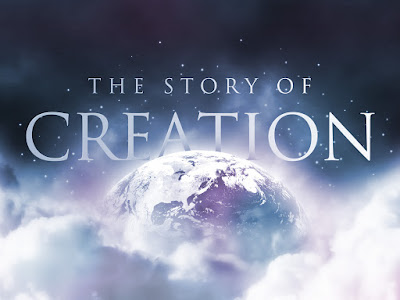IN THE BEGINNING | STUDY
 1. Bible History
1. Bible History a) In this panoramic Bible Story, we present the important events, and gradual development of Bible History, keeping in view, throughout, the spiritual purpose of divine revelation.
b) It exhibits a part at a time, by being unrolled before the viewer. An unobstructed or complete view in every direction; hence a comprehensive presentation to aid viewer with a better understanding of Bible History.
c) It follows the stream of the Bible narrative, so as to aid viewer in visualizing and grasping the great truths of Bible History.
2. In the Beginning- The Original Creation
- The Creation of the Universe to the Creation of Man
(Genesis 1 - 2)
a) "In the beginning God created the heaven and the earth." In this majestic explanation of the beginning of all things, the Holy Spirit introduces us immediately to God. There is nothing here for human speculation. This is all man ever has or ever will know about it in this world. "Lift up your eyes on high and behold who hath created these things?" (Isaiah 40). The fact of a material universe stares every creature in the face, and the word of God contains the only truly acceptable account of its creation. Geologists may explore and speculate on stratas and fossil remains, but "the secret of the Lord is with them that fear him."(Psalms 25:14). "Through faith we understand that the worlds were framed by the word of God, so that things which are seen were not made of things which do appear." (Hebrews 11:3). The Hebrew word, bara, "to create", in its proper and primary sense is that of the divine act of absolute creation without the use of pre-existing material. To call into being that which was not, by the divine fiat. (Latin, fiat - "Let it be done", hence a sanction, or decree). "By the word of the Lord ... by the breath of his mouth" (Psalms 33:9). "... he commanded and they were created." (Psalms 148:5).
b) "In the beginning". When that beginning was we are not told, but without doubt this majestic declaration refers to the dateless past, when the heavens and the earth were originally created by the act, and will, and word of Almighty God.
c) Now Genesis 1:2 tells us that "earth was without form and void", (Tohu and Bohu - confusion and emptiness). That this is not the description of the earth when it was originally created "in the beginning", is forever settled by the words of Isaiah. "He (God) created it not in vain (Tohu and Bohu), He formed it to be inhabited." (Isaiah 45:18).
d) The Hebrew words, "Tohu and Bohu", here translated "in vain", are exactly the same words as translated "without form" in Genesis 1:2. The Revised Version reads "He created it not a waste."
e) The word "was" in Genesis 1:2, may equally well be translated "became", waste and void, as indeed it is so rendered in Rotherham's Emphasized Bible. "Now the earth had become waste." The same Hebrew word is found in Genesis 19:26. Lot's wife "became"" a pillar of salt. She was certainly not always so, but "became" so.
f) Genesis 1:1 is complete and conclusive in itself and refers to a prior act of God in the dateless past. Genesis 1:2 indicates that the earth, for some reason, veiled to us, but clearly known to God, was brought to desolation and chaos. How long elapsed between God's original act, and this scene of desolation we are not told. But that same cataclysmic change took place on the earth, changing its physical features, and reducing it to "confusion and emptiness", is beyond doubt. Though we cannot say with certainty Why or How, with thoughtful study we find God's Word is not without intimations of such a catastrophe. We know however, that in verse three, God begins to "renew the face of the earth." To prepare for it for a dwelling place for man. As in the words of the Psalmist, "Thou sendest forth thy spirit and they are created, and Thou renewest the face of the earth." (Psalms 104:30).
g) On the Second of the "six days" preparation of the earth for man's dwelling place, it is not said that God "created" the waters, but "divided" the waters. We do not read that God "created" the sun and moon on the fourth day, but that He made (asher) two great lights (light-holders, in the original) adjusting them as they are now, to the earth which was to depend upon them for light and the measurement of time. They were created "in the beginning." Again we are told that God said "Let the dry land appear." This was not the creation of the earth, but as Genesis 1:9 declares, it was the gathering of the waters unto one place, that the dry land (created in the beginning) might appear.
h) There are only three original creative (bara) acts of God recorded in the Mosaic account:
@1. The heavens and the earth, "in the beginning."
@2. Animal life.
@3. The creation of man.
Comments
Post a Comment